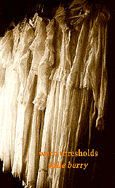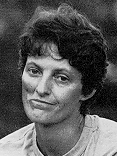


|
worn thresholds.
Julie Berry.
London, ON: Brick Books, 1995. 106pp, paper, $11.95.
ISBN 0-919626-75-0.
Grades 10 and up / Ages 15 and up.
Review by Liam C. Rodrigues.
*** / 4
|
margaret's madhouse
demons hang from doorknobs
devils lurk in the dark of keyholes
bite the meat of her hand
doors have undone her
once she loved a man
touching him
her hands turned to
wings
feathered
white
having the baby was the worst
blood follows her now
down all the shining hallways
In the persona of a poor poet reflecting on the evolution of his craft,
Czeslaw Milosz wrote that "The first movement is singing,/ A free
voice, filling mountains and valleys./ The first movement is joy,/ But it
is taken away." Milosz wrote The Poor Poet in Warsaw in 1944 --
a particularly devastated city in a worn-out,
war-torn world. Eastern Europe was on the threshold of change, and the
veneer of hope had worn thin. Milosz knew what gave birth to the spirit
of poetry -- but, in a landscape politically ransomed, "a cynical
hope" was at best what lingered of the poet's lyrical voice.

Although, Julie Berry crafts her poems out of a different context,
worn thresholds is an odd combination of Milosz's poor poets: boisterous
and lyric, but also reflective and political. One cannot escape the
gender politic that forms Julie Berry's world picture: there are
children, and then there are men and women. In innocence we are together,
but while being in the world, we become estranged, men from women, women
from men. Berry is a woman who laments, is even somewhat angered by, the
estrangement. In this respect, there is much of the later poor poet in
Julie Berry. She is truthful, but I am not sure that I always like it.
Published in May of 1995, worn thresholds is
Julie Berry's first collection. As her brief bio tells us, however, her
work may be familiar: her poetry has appeared, or is forthcoming, in such
journals as Room of One's Own, Quarry, and Canadian
Forum.
A formidable first volume, worn thresholds is divided
into five sections, containing close to sixty poems. Often lucid, yet
simple, most of the poems benefit from Berry's skilful use of the short
line and clipped rhythms. In "the dissection kit," for example, the
juxtaposition of varied line lengths, the broken rhythms, and the stark
absence of adjectives create a vision of the world that permeates the
book:
the case is empty now
i threw it out
afraid to think
where all those instruments have gone
but a woman needs to know such things
a woman must keep house better than that
Although I am still deliberating exactly how to feel about Julie
Berry's take on things, worn thresholds is an interesting
collection of poems for this very reason. It conveys a tangible persona.
Whether the author is present here or not, there is a great sense of a
narrative character: one who looks out and sees a landscape unadorned and
a humanity simplified.
Recommended.
Liam C. Rodrigues is a Toronto-area writer interested in art,
architecture, poetry, and all that liberal arts stuff.
To comment on this title or this review, send mail to cmeditor@mts.net

Copyright © 1996 the Manitoba Library Association.
Reproduction for personal use is permitted only if this copyright notice
is maintained. Any other reproduction is prohibited without permission.
Published by
The Manitoba Library Association
ISSN 1201-9364
 Go back to CM Welcome page
Go back to CM Welcome page
 Go back to Table of Contents for this Issue
Go back to Table of Contents for this Issue




![]()
 Go back to CM Welcome page
Go back to CM Welcome page Go back to Table of Contents for this Issue
Go back to Table of Contents for this Issue